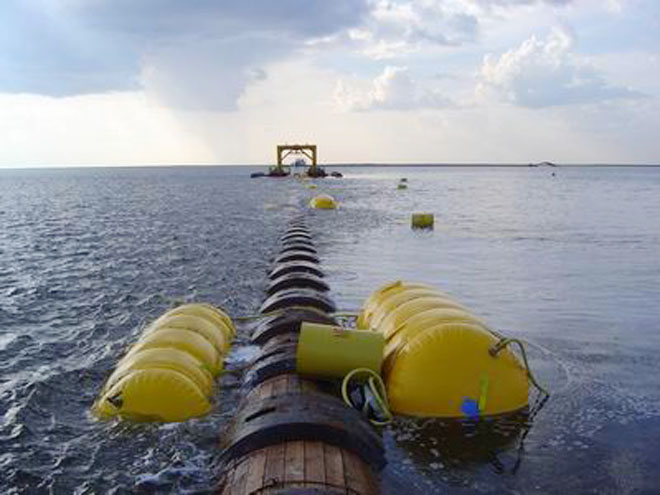Azerbaijan, Baku, Sept 7 /Trend /
Azer Ahmedbeyli, Trend analytical centre expert
Shale revolution, alternative energy, a Russian-Iranian opposition, the discovery of major new gas fields offshore Cyprus, Israel and Egypt - all of these factors will not ultimately affect the creation of the so-called Southern Corridor for the export of Caspian gas to Europe due to a number of political and economic factors.
The economic feasibility of the Southern Gas Corridor and in particular the construction of 300 km of pipes beneath the waters of the Caspian Sea (Trans-Caspian gas pipeline) instead bend around it from the north, or from the south, is said to be cheaper and shorter. The political component of the issue is also not often publicly voiced: in European support for the construction of the Trans-Caspian because it wants to get a new source of gas supply and therefore, relative freedom from Russian dependence. The Iranian route is unacceptable to Europe because of the current confrontation with Iran and the relationship of the West in general.
However if the situation with Azerbaijani gas is clear, then there are questions about future exports of Turkmen gas. A meeting of senior representatives of energy ministries of Azerbaijan, Turkey, Turkmenistan and the EU Energy Commissioner Günther Oettinger, was held earlier this week in Ashgabat and was another step in the achievement of this goal. The main issue in the talks was the implementation of the Trans-Caspian gas pipeline.
It seems that talks in Ashgabat satisfied all parties. Press secretary of the EU Energy Commissioner Marlene Holzner said that "it was a very constructive meeting in which all parties have demonstrated that they are interested in the continuation and implementation of the Trans-Caspian pipeline."
President Gurbanguly Berdymuhamedov said that Turkmenistan is interested in early energy exports to Europe which is responsible for the multi-vector policy in diversifying energy export routes, which he conducts.
Azerbaijan confirmed its position that it is ready to create favourable conditions for Turkmen gas to transit through its territory. The Turkish side has put emphasis on the interest of the country and the TANAP project in Turkmen gas.
Some 199 billion cubic meters of Russian pipeline gas exports out of the 207 billion cubic meters goes to Europe, including Belarus and Ukraine (BP data for 2011).
The ten billion cubic meters of Azerbaijani gas, which is planned to export to Europe through Shah Deniz in 2018 is negligible compared to Russian figures. Another thing, if the Turkmen - first 10, and at least another 30 billion cubic meters of gas in the future will be added to Azerbaijani gas. Russia does not want to share the European gas market - the best in terms of price, and yet the most insatiable with someone.
Iran also thinks about its advantages from the project. While commenting on the export of Turkmen gas via Trans-Anatolia Pipeline (TANAP), director of the National Iranian Gas Export Company (NIGEC) Bidarmaghz said that the transportation of Turkmen gas via the Caspian
Sea and further through Trans-Anatolia Gas Pipeline is impossible, because Iran and Russia will not allow gas pipeline laying through the seabed to protect the ecology of the Caspian Sea. Therefore, he added that the Turkmen gas may be supplied to Trans-Anatolia Pipeline only
through Iran. He said that Iran is ready to transport Turkmen gas through its territory to Turkey.
Meanwhile, the EU shows that it also has leverages over Russia's position in gas issues. Almost simultaneously with the meeting in Ashgabat, the European Commission announced about launching the official anti-trust investigation over the Russian gas company
"Gazprom".
"Gazprom" is suspected of dividing the gas market to obstruct the free supply to the EU countries, as well as preventing the diversification of fuel sources. The search operations were conducted in several European offices of the company. If the facts of monopolizing the European gas market by "Gazprom", it will face great sanctions.
Europeans are waiting for the interstate agreement to be signed between the two littoral countries, otherwise, any European company or a financial institution will hardly to agree to invest its own capital in the project. From this point of view, a precedent will be the main
incentive for Turkmen gas delivery to the European market.
"Shah Deniz" consortium members will determine the route of gas export to European destination in the first half of 2013. After the final investment decision is taken, the construction operations may be launched. This event will be the basis of the future agreements on using Turkmen gas in the Southern Gas Corridor if not today, then tomorrow.
In September, the WB must call the winner of the tender announced for the preparation of the report on the assessment of environmental and social impact assessment under the Trans-Caspian gas pipeline project. The tender was announced on the basis of the European Commission's
appeal to the WB. Six consortiums led by well-known companies attend it. One can judge about the scope of the work, the complexity and the cost of the ESIA preparation by the time to be allocated for its preparation - about 30 months.






